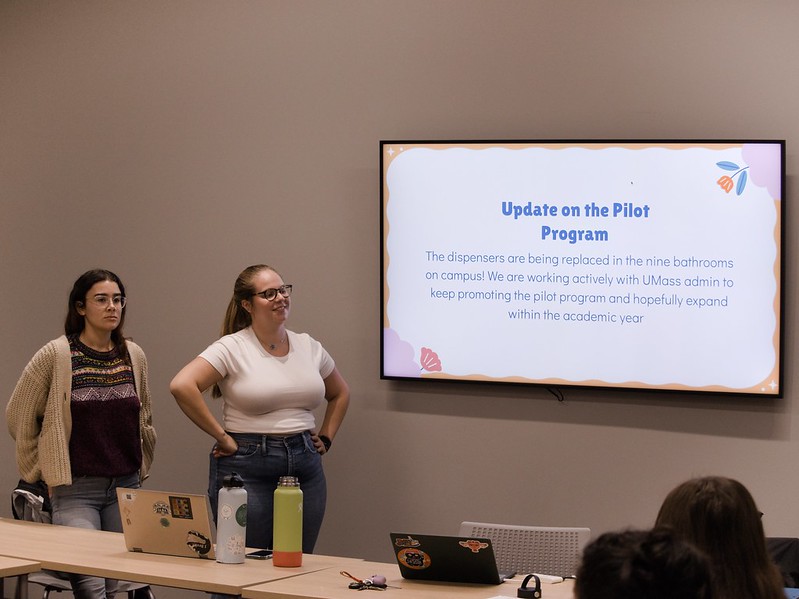The student organization PERIOD is holding a period product and toiletry drive through Friday, Oct. 21, aiming to give the donated products to the Amherst Survival Center and possibly the Student Care Supply Closet.
Partnering with Small Acts for Sustainability, PERIOD is collecting monetary donations as well as period products including pads, tampons, shampoo, conditioner, bars of soap, disposable blades, lotion, toothpaste, toothbrushes, new underwear and menstrual cups.
PERIOD was founded in 2020 with a mission to educate the University of Massachusetts community about unequal access to menstrual products. On their Instagram page, they stand by the slogan that “Period products are a necessity not a luxury.”
The drive began collecting donations Oct. 7, and since then, the organization has raised $588 and a number of products. Their goal is to raise more money than the previous two years, when they raised $800. The money allowed the organization to purchase 137 packages of menstrual products, which it donated to Amherst Survival Center.
Karishma Mistry, co-president of PERIOD and senior public health and economics double major with a minor in gender studies, says there is a problem with how many Americans view periods as something that do not need to be talked about. According to Women In International Security, 500 million people who menstruate experience period poverty every month.
Mistry works alongside co-president Ellen Kiernan, a senior sociology and political science major.
“What I like about PERIOD is being so close to people who are very passionate about menstrual equity and learning from other people. It’s very inspiring,” Kiernan said.
“I love the culture we’ve created about advocating for menstrual equity on campus. We’ve really gotten the word out about supporting menstruators and combating period poverty and then providing access to period products on campus in the bathrooms … and we are trying to expand that, so I’m really excited about all the work we do,” Mistry added.
Its pilot program aims to supply free pads and tampons for students and staff to use in campus bathrooms. As of last September, PERIOD already implemented free period products in nine bathrooms, which include Rooms S290, S293, S295 in the Integrative Learning Center, Student Union Room 306, Isenberg School of Management Room G39, Morrill Science Center II Rooms 216C and 239, Thompson Hall Room 105, and Herter Hall Room 233.
Sophomore Megan Allen is a psychology and education double major. As a PERIOD member, she touched on how the pilot program will be helpful to her.
“I joined PERIOD because I actually have endometriosis, and it’s something I’m really passionate about,” she said. “I’m really interested in the pilot program because I’ve definitely been in need of products on campus, and I think it would be really great to have that on campus for other people with endometriosis like me who may need it. I’m so excited to see the future of PERIOD and be a part of the club.”
Amelia Laino is a sophomore biology major and the social media chair for PERIOD. She also said that it’s important to remember certain health conditions like endometriosis and PCOS when considering the topic of menstruation.
According to Johns Hopkins Medicine, endometriosis is a condition where tissue that normally sits inside of the uterus sits outside of the uterus instead. PCOS, or Polycystic Ovary Syndrome, is caused by a reproductive hormonal imbalance in women.
“Just because it’s common doesn’t mean it’s normal,” said junior Maia Medina, the organization’s treasurer and landscape architecture and BDIC dual major. “So I think it’s just important to kind of highlight that if you are going through something and you feel very alone, there’s help. There’s definitely resources for you, so I think that’s something that we’re trying to get out in the community and greater public.”
Junior public health and geography double major Amanda Lookner works as the secretary for PERIOD. She says it’s important to keep in mind how differently people experience periods. Some go through extreme pain, while for others, their periods do not affect their lives as significantly.
During meetings, the group focuses on social media outreach, educating local communities on period resources and poverty and develops a newsletter for upcoming events and information. PERIOD also aims to collaborate with Amherst and Northampton high schools for a period education program in the spring.
As a part of its newsletter, PERIOD puts out media highlights. Member Bridget Ducey, a junior public health and economics double major, shared her thoughts on the documentary “Period. End of Sentence.” This 2018 film tells the story of women in rural India who struggle with the stigma around periods and access to menstrual products.
“A big takeaway of it is how different it is from here. Here we struggle with period poverty, but it’s just to a different level, and we’re just so unaware of it. We’re so detached from it,” Ducey said. She points out how in some communities, people do not talk about periods or even know about them.
“I also think it’s easy to forget that people do have periods,” Medina said, adding that because periods are a private matter, “it’s just really important to get people aware that this is a huge issue.”
PERIOD holds weekly meetings on Mondays at 7 p.m. in the Student Union Room 329, open for anyone to attend. Resources can be found via Instagram @period.umass, and PERIOD can be contacted via email at [email protected]
Ryanne Campbell can be reached at [email protected].



















